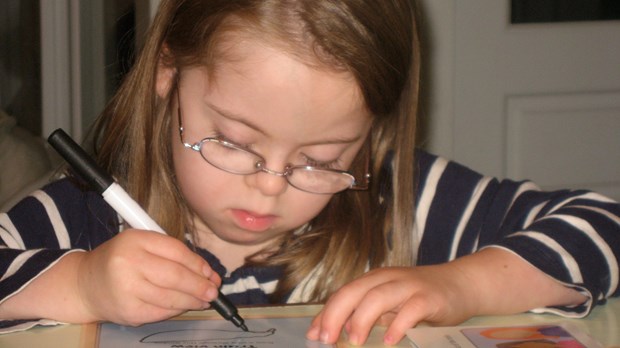
A friend of mine read a prayer at church yesterday which included a reference to "the epileptic boy." She received criticism later on because she hadn't used "person-first" language. She hadn't put the boy first and his diagnosis second. She could have said "the boy with epilepsy" instead.
Another friend pointed out that "epileptic" is an adjective. From a technical standpoint, the boy remains the subject of the sentence, the primary focus. His epilepsy is a secondary descriptor by the fact of the sentence structure itself.
Adjectives do describe nouns, and yet it is also true that language not only reflects reality but helps to form and shape it. Many people reduce people with disabilities and diseases to their diagnosis without seeing the fullness of their common humanity. And if changing our language can change our perception of reality, then I am all for it, regardless of the grammatical implications.
When our daughter Penny was born, I referred to her as a "Down syndrome baby." It sounded funny to me even as I said it, and perhaps it was just the English major in me recognizing that "Down syndrome" is not an adjective and thus shouldn't be used to describe a baby. In time, however, I read an explanation of person-first language. I started calling her "our baby with Down syndrome."
It felt awkward and wordy at first to go from calling Penny a "Down syndrome child" to a "child with Down syndrome." But that simple linguistic shift led to a more profound transformation. If I had put Penny in a "Down syndrome box" when she was born, then I might very well have believed my fears that we wouldn't share common loves and yet Penny loves books as much as her mother. I might have believed my fear that she wouldn't have friends, and yet I found her and her best friend snuggled under the covers at 3:45 a.m. this weekend as they giggled their way through their first sleepover. I might have believed that she wouldn't be able to grow and learn and thrive.
If I had put Penny in a "Down syndrome box" when she was born, I might also have missed out on the other kids in our life with disabilities. I might have reduced them to their diagnosis or only noticed the things that make them different from their peers. But instead I've started to see who they are as people, not simply defined by their diagnosis.
It isn't incidental that Penny has Down syndrome. It isn't an afterthought. It affects the way she looks and talks and thinks. It affects the activities she chooses, games she wants to play, and possibly even the friends she has. And yet knowing that Penny has Down syndrome doesn't mean that you know her.
Jesus was constantly usurping attempts to put people into categories--whether the categories we construct based on race, religion, or disability. He refused to agree with the disciples who wanted to see the man born blind as an example of sin. He insisted upon speaking face to face with the woman who had been bleeding for twelve years and calling her daughter. If he were here today, I suspect his language would reflect his reality--that the beloved humanity of each individual is of utmost importance.
Grammatically speaking, it's fine to say "epileptic boy." But I'm going to err in the direction of "boy with epilepsy," and in the direction of "person-first language" more generally, with Penny, with her classmates, with all the other people who come my way, as a way to simply acknowledge with my words that our common humanity comes first.
(As an aside, I have written about the first time I learned about person-first language in my book A Good and Perfect Gift. It is available as a FREE ebook today only at all major book retailers.)
Support our work. Subscribe to CT and get one year free.
Recent Posts

Why Person-First Language Matters
Why Person-First Language Matters
Why Person-First Language Matters
Why Person-First Language Matters














